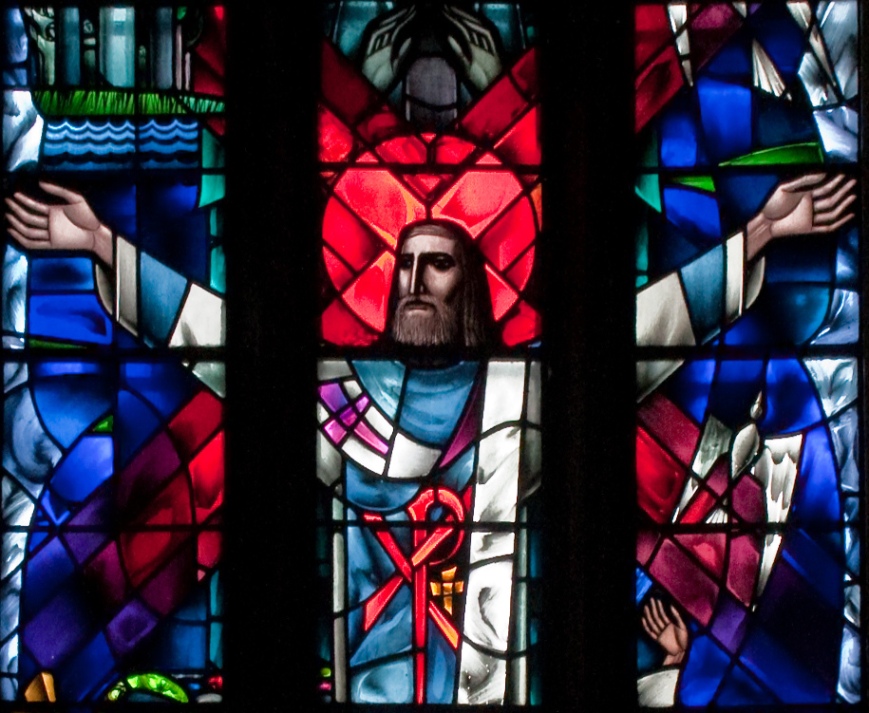
St. Patrick’s Window, Tuam Cathedral. Image: Andreas Borchert (CC BY-SA 2.0)
Introduction
If there’s one aspect of the Historical Patrick that really gets certain people agitated, its the academic issue of his ‘episcopal’ status. St. Patrick is not only a national icon, saintly superhero and patron saint – he is also a figure of much personal devotion. For many Irish people, he represents a very important tenant of the early reception of their faith and the very foundation of their national ecclesiastical identity. To this day, Irish church hierarchies still maintain that their religious authority and legitimacy stretches right back to his very personage. To question such a long and entrenched tradition naturally runs the risk of offending modern religious sensibilities. One doesn’t do so lightly.
Nevertheless, its remains important to. For several reasons.
Firstly, because we can. Not so very long ago, such an endevour would have been seen as utterly scandalous and I would probably have been denounced from an altar, hosed down with holy water and/or run out of the country, for even daring to.
Secondly, because we should. Academically separating the original historical Patrick from the later mythical ‘Saint’ Patrick serves to clarify the historical context and importance of both the man himself and the later literary culture, dynasties and ecclesiastical federations who championed and embellished his cult, whilst simultaneously preserving his actual writings. Ironically, their efforts now enable professional heretics such as myself the opportunity to work with such wonderful source material.
Thirdly, because we must. Over the next year or so, ahead of the papal visit in 2018, we will surely be treated to increased PR spin concerning the early history of Irish Christianity and Rome – from those who naturally have a vested interest in maintaining certain narratives. St. Patrick will have a starring role. Much of it will be badly written, poorly researched and historically inaccurate. Almost all of it will be a travesty of the Historical Patrick’s own words, theology, actions and experiences.
And so, for the day that’s in it, I thought I would take a forensic look at the evidence of the Historical Patrick’s own words concerning his own episcopal status.
The TL;DR version goes a little something like this:
Patrick was a priest who was rejected by his superiors as being morally unsuitable for the episcopal grade. In other words: he wasn’t officially ordained a bishop. He eventually decided to set out on his own mission to Ireland, in spite of everything, disobeying his superiors and the wishes of his family, and suffering deep suspicion, criticism and derision for the rest of his life for having done so. He had no official sanction from anybody, either in Britain, or indeed Rome – and he and his mission was largely unrecognized by many of his Christian peers. That he is now held up by modern hierarchies as a national symbol of institutional foundation, orthodoxy and primacy is completely ahistorical. If anything, it actually serves to diminish the very memory and actual lived experience of the historical man himself.
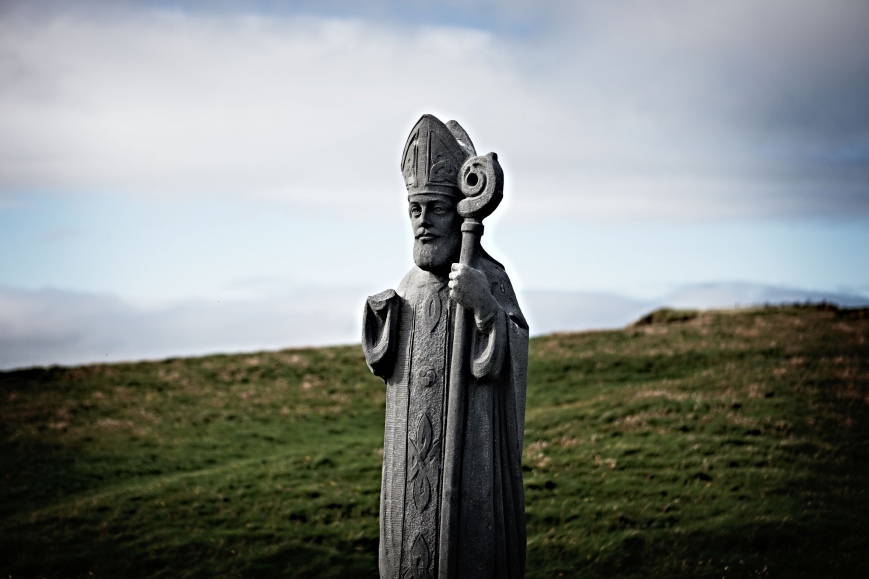 Image: TheMaskAndMirror (CC BY-NC-ND 2.0)
Image: TheMaskAndMirror (CC BY-NC-ND 2.0)
A Real Nowhere Man
Before we delve deeper into his own texts on the matter, there is in fact a rather simple series of arguments against those who would maintain that Patrick was officially ordained a bishop. Patrick’s writings, particularly his Confessio, are a detailed defense of his actions in Ireland written in response to a series of allegations against him from fellow British Christians. If Patrick had been ordained a bishop, it would have been a substantially smaller document. Considering the criticisms leveled against him, one would think that his first line of defense would have included emphasizing his professional authority and legitimacy. Especially from an archbishop/pope. Yet Patrick never once uses such an argument, or indeed, refers to anyone at all as having sent him. On the contrary, he mentions several times that he considered his authority to have been divinely received.
When you also consider that many of the accusations against him from his British critics seem to have involved the charge that he had ulterior motives for returning to Ireland – one is left with a rather strange impression. If Patrick had been officially ordained, such charges make no sense. Even if he had disgraced himself by getting up to all sorts of dodgy shenanigans after coming to Ireland – the very fact that he had been dispatched (in an official capacity, by higher authorities) would not be an issue at all. And yet, for his Romano-British detractors, it appears to have been a major one.
There is the small matter of any higher ecclesiastical authority in the late 4th/early 5thC AD having much of an interest in dispatching a bishop to a pagan peoples beyond the imperial frontier. And again, even if they had, that they would have sanctioned someone who spent his time constantly gallivanting around with no clear or fixed episcopal boundaries – in contravention to contemporary regulations and council decrees on the appropriate behavior and professional responsibilities of bishops.
Then there are numerous examples throughout the writings of Patrick where he explicitly utilizes biblical quotations (and references to Pauline theology) in order to justify his mission to pagan ‘gentiles’ (Irish) at ‘the ends of the earth’ (Ireland). I don’t know about you, but when a Christian missionary needs to justify and explain the reasons for a Christian mission to the Pagan Irish, to fellow Christians elsewhere, by harnessing Christian metaphorical reasoning and charity from the Bible – then it seems to me that his Christian audience were really struggling to understand what the hell he was up. From their perspective, it was not a role he had ever been assigned or expected to undertake.
Lastly, there is the issue of the earliest surviving Irish version of his Confessio, copied in the ninth century into the Book of Armagh. The most interesting aspect of this version is the extent to which it has been redacted. All controversial elements of Patrick’s own words, the accusations against him and references to his lack of recognition from fellow Christians etc, were deliberately removed. Armagh authorities (who had already appropriated him for All-Ireland primacy) were particularly uncomfortable with his own words to the contrary. Their ninth century act of censorship speaks for itself. If even they could see it back then, there really is no excusing their modern day equivalents.
This is made all the more apparent if you consider that more complete versions of Patrick’s original writings were well known, two centuries beforehand, to his early seventh century hagiographers, Muirchú and Tírechán. The latter even explicitly references portions of Patrick’s Confessio which do not appear in the Armagh version – but are found in the other (later) copies of the same in Britain and on the continent. For some reason, 9thC Irish churchmen found these aspects of his writings objectionable enough to ‘leave out’, whilst others outside the island had no such concerns. As if the Early Medieval Irish authorities in Armagh had something specifically invested in a particular portrayal of Patrick that would have been undermined by the inclusion of the above.
Essentially, the complete version of his Confessio, as we have it today (thanks to several independent copies made over the centuries and preserved outside Ireland) is something that 9thC Irish churchmen did not want people within Ireland to ever know, comprehend or even read for themselves. One does not need to be an Einstein to do the ecclesiastical math.

Image: Matthew DeWaal (CC BY-NC 2.0)
Sitting In his Nowhere Land
All that aside, lets start with some of his own inferences to his being a self-appointed bishop without sanction:
Non usurpo. Partem habeo cum his quos aduocauit et praedestinauit euangelium praedicare in persecutionibus non paruis usque ad extremum terrae…
I am not claiming too much. I have a part with those whom He has called to (Him) and predestined to proclaim the Gospel among not insignificant persecutions as far as the most remote part of land…
Epistola 6 (Trans: Howlett, 1994)
In his Epistola, after setting out the reasons as to why he is denouncing Coroticus, a British slaver, for trespassing against himself and his Irish converts, Patrick suddenly stops and declares the above. Its as if he is anticipating an initial backlash and ill reception to his appeal for justice from British Christians. Which is a strange thing to be concerned about, if he was an ‘official’ bishop.
Traditionally, his words here have been interpreted as Patrick seeking to reassure British ecclesiastics that he was not trying to muscle in on their territory. And that kind of make sense. Except for one thing. The British Coroticus and his band of soldiers/pirates had attacked, killed and kidnapped a group of Patrick’s converts in Ireland. If he was an official bishop, he would have been perfectly entitled to complain and appeal against those who had offended him in his own territory.
And yet, Patrick’s first thought, after setting out his stall, is to anticipate criticism from fellow British Christians. Along the lines of his having ‘usurped’ something in Ireland. The key term, of course, is his use of the word usurpo. Note also, the inference and biblical nod to God having predestined some to help spread the word to pagans at the ends of the earth. God. Not any earthly ecclesiastical authorities.
Et si mei me non cognoscunt, propheta in patria sua honorem non habet…
If even mine do not recognize me, a prophet does not have honour in his own fatherland…
Epistola 11 (Trans: Howlett, 1994)
Here, after having declared that he is not embarrassed in any way, and does not regret, having sold his own patrimony in order to be be a servant of Christ to Irish pagans – Patrick references Matthew (13:57) & John (4:44) about how misunderstood prophets are not recognized by their own. Patrick was not among his own in Ireland. His ‘own’, were those he was writing to, in Britain. They were the ones who did not recognize him or his mission. Also, note again, the lead in to above i.e. Patrick’s repeated inference that he organized his own mission by ‘selling’ his own patrimony.

Image: Emmet Ó hInnéirghe (Used with Permission)
Ecce iterum iterumque breuiter exponam uerba confessionis meae. Testificor in ueritate et in exultatione cordis coram Deo et sanctis angelis eius quia numquam habui aliquam occasionem praeter euangelium et promissa illius ut umquam redirem ad gentem illam unde prius uix euaseram.
I bear testimony in truth and in exultation of heart before God and his holy angels, that I have never had any occasion beside the Gospel and His promises that I should ever go back to that gentile people whence earlier I had barely escaped.
Confessio 61 (Trans: Howlett, 1994)
At the end of his Confessio, Patrick sums up his ultimate defense against his critics. Which is that he had no other reason or motivation to go back to Ireland, other than the Gospel. This clearly suggests that as far as his detractors were concerned, he had no official ‘business’ going back at all, leading to their suspicions that he had ulterior motives.
Knows Not Where He’s Going To
Patricius peccator indoctus scilicet Hiberione constitutus episcopum me esse fateor. Certissime reor a Deo accepi id quod sum…
I Patrick, a sinner, untaught, to be sure, established in Ireland, profess myself to be a bishop. Most certainly I consider that I have received from God that which I am…
Epistola 1 (Trans: Howlett, 1994)
This is perhaps the most blatant example. At the very start of the Epistola, Patrick identifies himself to British Christian recipients. He actually professes himself to be a bishop. Again, a somewhat strange thing to say if he had been consecrated a bishop by ecclesiastical authorities in Britain. Note the qualification afterwards. Whatever he is – another acknowledgement that some of his British audience will probably not even accept his introduction and self-declared episcopal status – he has received from God. Not man.
Igitur in illo die quo reprobatus sum a memoratis supradictis ad noctem illam uidi in uisu noctis scriptum erat contra faciem meam sine honore, et inter haec audiui responsum diuinum dicentem mihi: Male uidimus faciem designati nudato nomine….
So then on that day on which I was reproved by those called to mind, the above said (i.e senioribus meis ‘my elders’) on that night I saw in a vision of the night what had been written against my face without honour, and amidst these things I heard the divine answer saying to me, ‘We have seen (how) badly the face of the man marked out with his name stripped naked’…
Confessio 29 (Trans: Howlett, 1994)
Here Patrick refers to the time he was ‘reproved’ by his ecclesiastical elders. The key term is reprobatus, i.e ‘disapproved, rejected, condemned’. His name metaphorically marked, or crossed out, in disgrace.
Idcirco gratias ago ei qui me in omnibus confortauit, ut non me impediret a profectione quam statueram et de mea quoque opera quod a Christo Domino meo didiceram…
Because of that I give thanks to Him who has strengthened me in all things, so that He did not impede me from setting out on the journey which I had decided on, and also from the task which I had learned from Christ my Lord
Confessio 30 (Trans: Howlett, 1994)
Here, Patrick thanks and credits the divine for not impeding him (as opposed to humans) from setting out on his own mission that he himself had decided upon. The task at hand, as far as he was concerned, was a heavenly order from Christ himself. Not earthly men.
…etiam mihi ipse ore suo dixerat:‘Ecce dandus es tu ad gradum episcopatus’, quod non eram dignus. Sed unde uenit illi postmodum ut coram cunctis, bonis et malis, et me publice dehonestaret…
…He himself had even said to me from his own mouth, ‘look, you are to be given over to the grade of the episcopate’, which I was not worthy of. But whence did it come to him afterwards, that in the sight of all, good and bad, he should dishonour me even publicly…
Confessio 32 (Trans: Howlett, 1994)
Here, Patrick refers to an ecclesiastical friend and confessor, to whom he had confessed a youthful discretion almost thirty years beforehand, as being the one who instigated his disgrace by divulging it publicly – and bringing about their finding him unsuitable for the grade of bishop. As far as he was concerned, he could, perhaps even should have been given the rank – but he wasn’t. He was dishonored and disgraced instead.
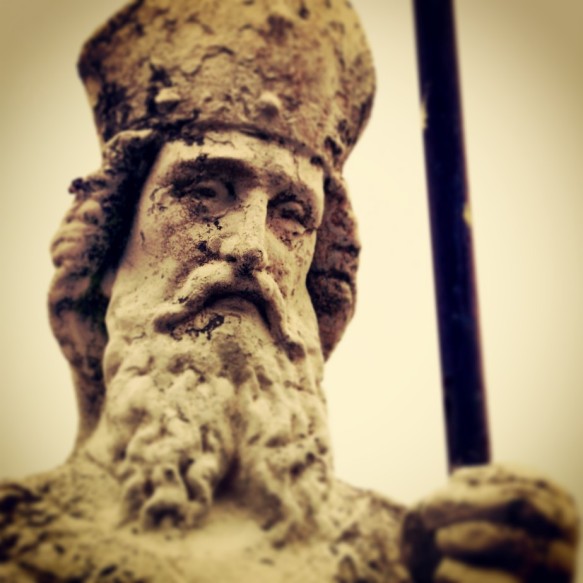
Image: Author
Making All His Nowhere Plans
Et munera multa mihi offerebantur cum fletu et lacrimis et offendi illos, nec non contra uotum aliquantis de senioribus meis, sed gubernante Deo nullo modo consensi neque adquieui illis — non mea gratia, sed Deus qui uincit in me et resistit illis omnibus, ut ego ueneram ad Hibernas gentes euangelium praedicare…
ut audirem obprobrium peregrinationis meae,
And many gifts kept being offered to me with weeping and tears, and also against [my] wish a certain number of my elders, but with God acting as captain in no way did agree with them or acquiesce, not by my grace, but God who conquers in me, and stood firm against them all, so that I had come to Irish gentiles to proclaim the Gospel…
…so that I might hear shame of my exile
Confessio 37 (Trans: Howlett, 1994)
This is a particularly clear example. Patrick’s family and friends, upon hearing of his missionary plans after his disgrace, pleaded with him not to go to Ireland. But he didn’t listen to them. As far as he was concerned, he was piloted by the divine, as he deliberately and consciously went against the wishes of seniors and did not give in to their requests/orders/arguments against him going.
Ecce nunc commendo animam meam fidelissimo Deo meo, pro quo legationem fungor in ignobilitate mea, sed quia personam non accipit et elegit me ad hoc officium ut unus essem de suis minimis minist
for Whom I perform an embassy in my ignobility, but as He does not receive theatrical impersonation, He chose me for this office, that I should be the one minster from among His least.
Confessio 56 (Trans: Howlett, 1994)
Once again, Patrick articulates his belief that he was chosen for the ‘office’ of bishop by God. Not men.
…quia multi hanc legationem prohibebant, etiam inter se ipsos pos tergum meum narrabant et dicebant: ‘Iste quare se mittit in periculo inter hostes qui Deum non nouerunt
…because many were hindering this embassy. They were even talking behind my back and saying, ‘Why does this man dispatch himself in peril among enemies who do not know God?
Confessio 46 (Trans: Howlett, 1994)
Finally, here we see Patrick openly admitting that there was many people opposed to his mission. Not only that, it seems that they couldn’t even fathom why he would have even wanted to attempt to convert barbarian pagans in Ireland who had no concept or knowledge of Christianity, or indeed, why he wanted to ‘dispatch himself’ to Ireland. Which is something that doesn’t make very much sense of someone allegedly dispatched by official sanction.
For Nobody
When all is said and done, looking at Patrick’s own attempted explanations of his actions to his fellow British Christians leaves nothing to the imagination. Patrick clearly acknowledges that he had been rejected for the rank of bishop; that he had disobeyed the wishes of many of his seniors; that he had no official earthly sanction for his mission; and that at the end of his life, several decades after he had returned to Ireland, his fellow Christians in Britain still couldn’t understand why he had ever done so. To them, Patrick’s mission, and his very Christian reasoning for it, was just as alien and foreign as he was in Pagan Ireland.
A man from nowhere. In a nowhere land. Making nowhere plans. For pagan Irish nobodies.
****************
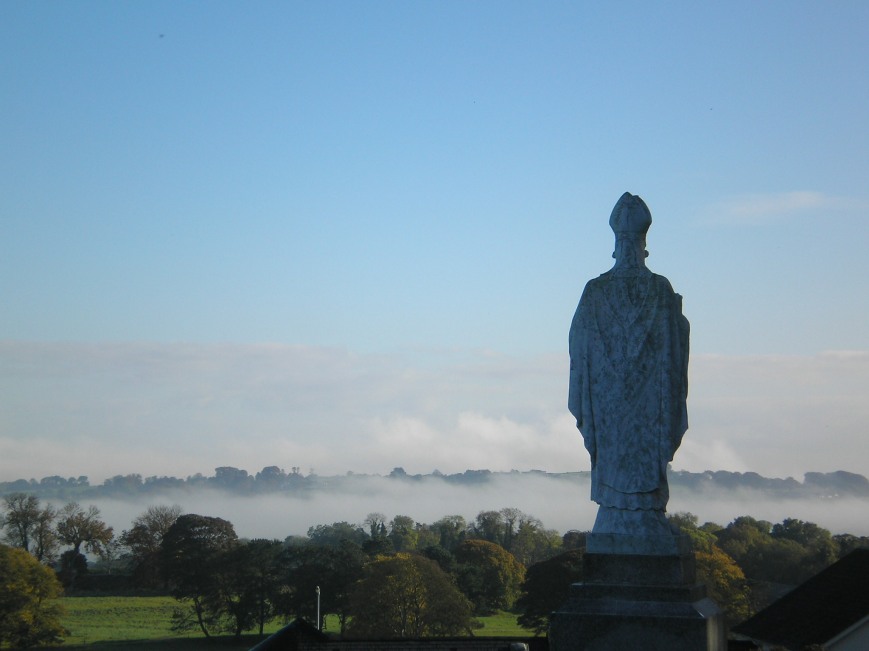
Image: Author
Of course, here’s where it gets really interesting.
Other than being used, abused and appropriated to within an inch of his hagiographical life by modern church hierarchies – who cares if he was ‘official’ or not? Who really gives a damn after 1500 years or so. Why bother?
Indeed, that is the very question. Why bother at all? Why would the Historical Patrick have even bothered to claim episcopal status?
He had already burned his bridges back home. He was already persona non grata to his fellow British Christians. He was alone in a foreign country, untouchable and unreachable by his critics. He could have told gullible Irish converts that he was the Pope for all they would have known. And despite what modern day hierarchies claim, he hadn’t the time, motivation, or even the inclination to establish a primatial see – so really – why bother?
Why was it so important for him to BE a bishop?
Think about it. You don’t need to be anything to be a missionary. Plenty of lay people have done so over the centuries. You probably do need to be a priest in order to administer sacraments and to baptize converts. But even then. What’s a bishop got, that a priest hasn’t?
The answer, I think, lies in several throwaway comments by Patrick himself.
In terms of sacraments, Patrick only makes reference to two. Baptism, naturally enough, and clerical ordination. Those are what Patrick was really interested in. Baptizing new converts and ordaining clergy for them. One needs to be a priest for the former. And one needs to be a bishop for the latter.
Why was Patrick interested in ordaining clergy? Well think about his probable missionary methodology.
Patrick says himself that he was constantly traveling around to disparate Christian communities in various territories, ministering to his converts and then heading out to new territories where no Christian missionary had ever been before. He was a man who would have never stayed long in any one place. Find those interested. Quick conversion course in a couple of weeks. Select the most promising ones. Make them priests. Maybe leave behind one of his more trusted droogs to keep an eye on things. ‘See you in three months time, when I’m coming back around. Behave yourselves. Say your prayers. Write if you have any problems’. Just like his hero, St. Paul. Apostle to the Gentiles.
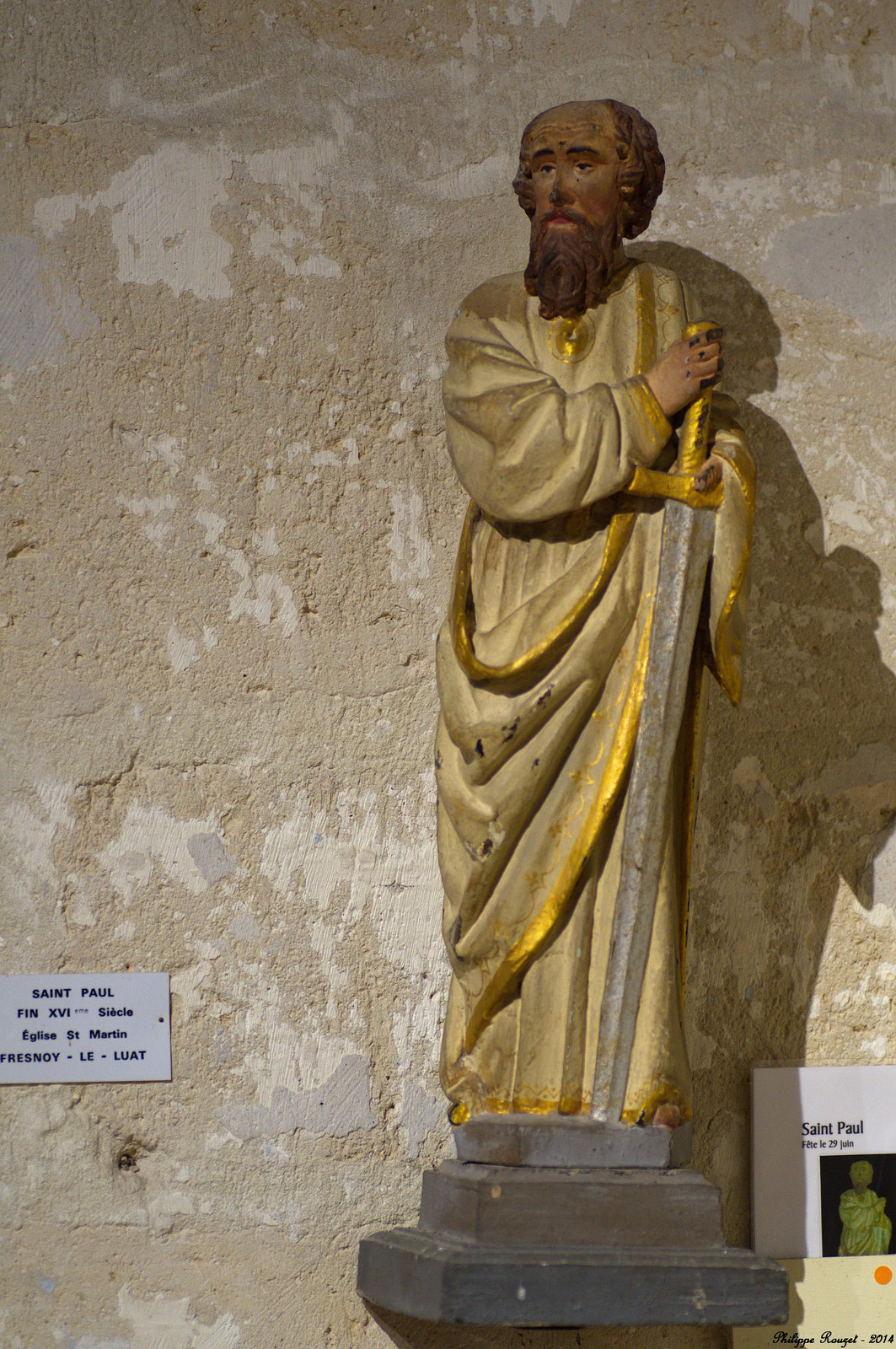
Image: Phil du Valois / Flickr (CC BY-NC-ND 2.0)
You have to remember, Patrick was a man in a hurry. As far as he was concerned he was living in the biblical ‘end times’. He genuinely viewed the world, and his mission, in Christian Apocalyptic terms. i.e. the end was approaching, and as soon as the ‘last’ of the gentiles at the western extremities of the most extreme westerly island of the known world (ie. pagan Ireland) were converted, that was it. Revelation ground zero.
Patrick was in the ‘saving as many souls as possible’ business, not some long term strategic takeover. His was a stripped down yellowpack Christianity. Basic. No frills. Short to medium term. The end of this world was coming. Quick baptisms. Ordain a priest to keep them going for a short while. Move onto new territory. Rinse. Repeat.
Can you imagine how that would have sounded to his fellow British Christians when news got back to them?
This, to me, is one of the more fascinating inferences of Patrick’s mission – and one that perhaps sheds light on just why British Christians would have still been agitated by his mission decades after he had left. Not only was Patrick’s missionary motivations and methods deemed to be suspect, or indeed, his claim of an episcopal status received by God. His very theological reasoning and actions must have raised eyebrows. Running around doing his thing alone would have been harmless enough. But creating some new half-arsed, half-baked class of a native Irish clergy? God only knows where that would end up.
Indeed. God only knows.
_____________________________________________________
Bibliography, Further Reading/Listening
Bieler, L. (1979) The Patrician Texts in the Book of Armagh. Scriptores Latini Hiberniae 10. Dublin: Dublin Institute for Advanced Studies.
Charles-Edwards, T. M., (2000) Early Christian Ireland, Cambridge: Cambridge University Press.
De Paor, L (1993) (Ed. and trans.) Saint Patrick’s World. Blackrock and Dublin: Four Courts Press.
Dumville, D. N. (1993) Saint Patrick: A.D. 493-1993. Woodbridge, Suffolk, Rochester: NY.
Howlett, D. R. (1994) Liber Epistolarum Sancti Patricii Episcopi. The Book of Letters of Saint Patrick the Bishop. Dublin.
Johnston, Elva. St Patrick: Historical Man and Popular Myth (UCD History Hub).
O’Loughlin, T. (1999) St Patrick: The Man and his Works. London.
Saint Patrick’s Confessio Hyperstack (Royal Irish Academy)

Pingback: Sobre Patricio – Mujerárbol
Pingback: ‘On Eagles Wings’ – Croagh Patrick: The Mount Sinai of Early Medieval Ireland | vox hiberionacum